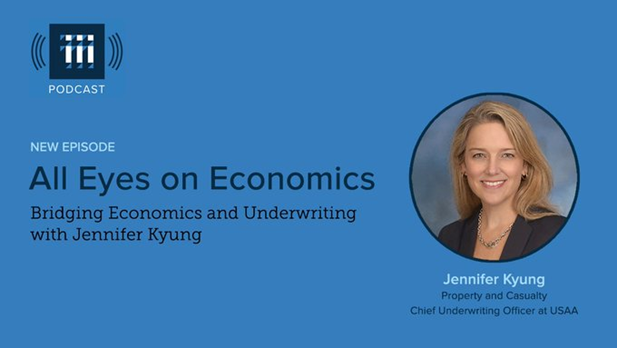By Lewis Nibbelin, Visitor Blogger for Triple-I
Residence and auto insurance coverage premium charges have been a subject of appreciable public dialogue as rising substitute prices and different components – from climate-related losses to fraud and authorized system abuse – have pushed charges up and, in some states, crimped availability and affordability of protection.
It’s vital for policyholders and policymakers to grasp the function of financial circumstances and traits in setting charges. Jennifer Kyung, Property and Casualty Chief Underwriting Officer at USAA, opens a window into the advanced world of underwriting and economics in a current episode of Triple-I’s All Eyes on Economics podcast.
Kyung informed podcast host and Triple-I Chief Economist and Information Scientist Dr. Michel Léonard that financial evaluation “is crucial to us in underwriting and as we handle our plan.” She described economics as “a part of our muscle reminiscence as underwriters” – including that the financial uncertainty of current years reinforces the necessity for underwriters to have “a really agile mindset.”
Underwriting and economics are “a little bit bit artwork and science,” representing a balancing act between refined knowledge analytics and inventive problem-solving.
“Once we take into consideration gross sales and premiums for householders, we could have a look at issues like mortgage charges or new house begins to point how the market goes,” Kyung mentioned. “In auto, we would have a look at new automobile gross sales or auto mortgage charges. These, together, assist us have a look at macro-economic traits and the setting and the way that may interaction with our quantity projections. That helps us with monetary planning, in addition to operational planning.”
“It’s actually crucial to maintain these on the forefront on an ongoing foundation all year long,” she mentioned, “so we will modify as wanted…. As our outcomes are available in, this offers context to the outcomes.”
Via continuous analyses of exterior market circumstances and the inner high quality and development of your small business, Kyung mentioned, underwriters “can handle and mitigate a number of the volatility and threat for our organizations.”
A instrument she recommends for evaluating financial indicators is Triple-I’s substitute price indices, which observe the evolution of substitute prices all through time throughout varied traces of insurance coverage and geographic areas. These indices allow insurers to synthesize uncooked financial knowledge and insurance coverage market traits, offering an auxiliary framework to bolster monetary and operational planning.
Kyung mentioned Triple-I provides extra perception into “native taste,” or “understanding what the rising points are…associated to the native setting,” by way of such instruments as Issues Briefs and Insurance Economics Profilers. Latest supply-chain disruptions have accentuated the connection between native and international economies, revealing the significance of using native financial analytics to interpretations of broader insurance coverage market patterns.
Such fusions may help facilitate environment friendly planning within the face of shifts within the insurance coverage panorama.
The total interview is offered now on Spotify, Audible, and Apple.
